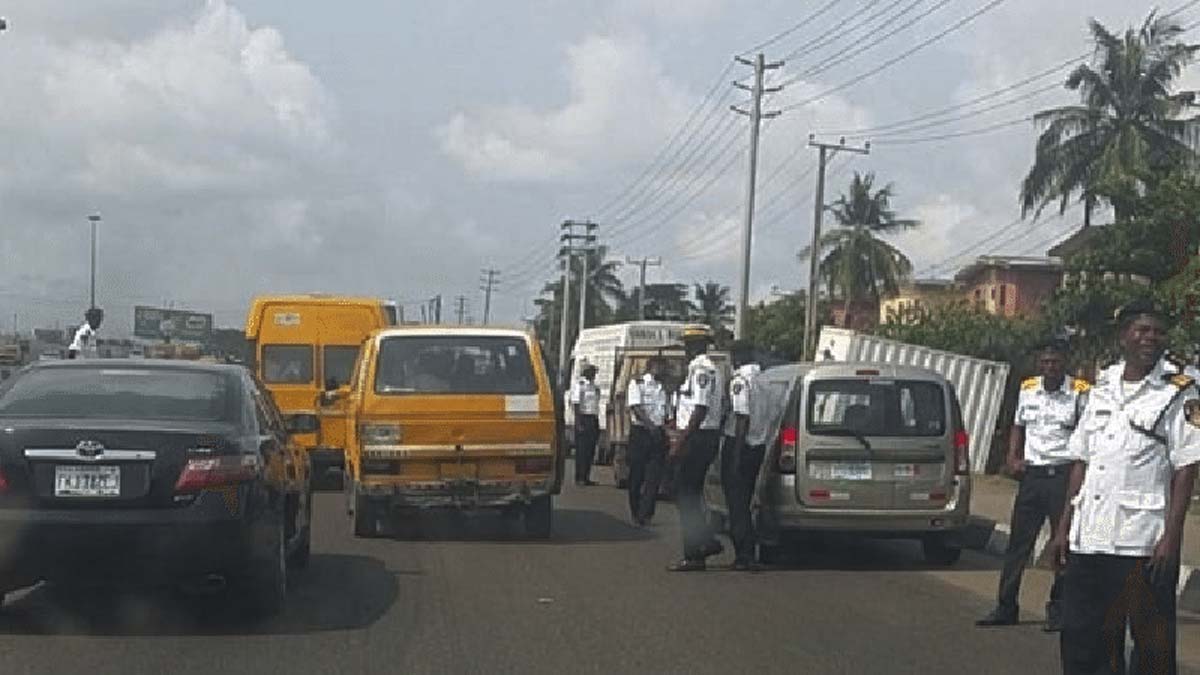
•Lagos motorists to pay N150,000 under new VIS reform
• Over 1,000 already sanctioned
Motorists and other stakeholders have continued to express concern over the reformed Vehicle Inspection Officers (VIO) operations and prescribed penalties within the Lagos metropolis.Indeed under the new reform, motorists have begun to receive fines through text messages since the resumption of the VIOs last December on Lagos roads with refined and mechanised process to ensure all vehicles are properly certified and compliant with traffic rules.
According to Vehicle Inspection Service VIS, over 1,000 motorists have received various sanctions through text messages to their phones, in addition to the hard copies handed over to them, to which such offenders have been complying.
Under the Lagos State Traffic Law 2012, motorists are expected to pay fines as high as N150,000 as penalty.Also the VIS confirmed that it has introduced a technology device called, Automatic Number Plate Recognition (ANPR), to check vehicle particulars, which is used in advanced countries.
Speaking with The Guardian, Director, Lagos State Vehicle Inspection Service, Gbolahan Toriola, said his officials are back on Lagos roads with a refined way of inspecting vehicles. Toriola said: “We have installed the ANPR in strategic locations, which is also installed on our vehicles, once our vehicles are parked at any location within the city, it captures vehicles that go against the traffic rules and vehicles without plate number and their fines are being sent to them in their homes.
“What we are doing now is of less human, and more technology interface to combat traffic offence; which makes our job easier,” he said, adding that defaulters have been paying their fines from home. Toriola told The Guardian that his men are out there to lookout for rickety vehicles, overloaded vehicles, as well as those that don’t have number plates, which is against the law, and vehicles on its blacklist.
“We are putting things in place the way it is done in other countries in America, and Europe after studying their processes.”An expert on road safety issues, Patrick Adenusi, said it is illegal to have taken the VIO officials off the road in the first place, while being humiliated and assaulted on Lagos roads, given that there is no place in the world where enforcement does not happen.
Adenusi said: “Just like what is done in the West, technology is what they use. If they are adopting the same process that means it’s in order. Population has nothing to do with their efficiency. As long as they are not mounting roadblocks; it is ideal, and it is where the world is going.”
On sustainability, he said: “Until it is giving a shot we will not say if it is sustainable. They are just starting off, and we do not expect them to go back, rather we expect that they will improve on it.“The cost effects on the technology acquired and even the equipment; I do not expect them to acquire the software and the equipment without putting them into use. So I believe that is the way to go, and I also believe it will yield light.”
Speaking on the reform, Dean, School of Transport, Lagos State University, Prof. Samuel Odewumi, said the reforms have been on for some time since last year. But sometimes the uncertainty in the society hinders or makes technology unpredictable.He said: “Our problem is largely human. The human element of our transport system is that our value and discipline do not support further technology. I have gone through the VIS new technology, and I have my reservations, but let them try it. Ordinarily, it would have work just like the U.S., as soon as you get to your house your fine will be waiting for you. It has also worked elsewhere, but our environment is another challenge. I will still advice that they roll it out, because if you don’t start, you won’t be able to perfect it.”
A motorist, Stephen Bodunrin, who had visited the VIS recently, said: “Let them perform their duties with due diligence on trucks, commercial vehicles, private cars and do the needful; otherwise, they should stay off Lagos roads. Also, our roads should be auto-friendly.”“The day I took my car for inspection, I was impressed with their services. I also encourage other car owners to do so, if not for the penalties, at least one should know the condition of his/her car,” Bodunrin added.
However, another motorist, Kewve Mike, described the return of the VIOs on Lagos roads as ‘wickedness’. “I thought they were banned, why are they back on the roads?” Speaking on the use of new technology, Mike queried the initiative, saying the tools may not last long owing to the attitude of government towards new policies.
But Principal partner of an automobile resource company, Media Advocate Limited, Manny Philipson, argued that the use of technology is the best method of arresting or apprehending traffic offenders in sane climes.“Why are drivers apprehensive of vehicle inspection officers? Provided you fix your car, and have the necessary documentation in place, you wouldn’t be harassed. It is obligatory that any motor vehicle on the road should be duly insured, licensed and certified fit to be driven on the highway, just as the driver is expected to be duly licensed. If these righteousness are fulfilled, the driver need not fear any inspection officer. That’s the norm all over the world. Let’s be law abiding.”
Speaking further Philipson said: “I’ve often times wonder why police and traffic officers chase offenders when technology can simply be deployed to screen the vehicle particulars, while details are instantly sent to the Transportation department to issue a ticket to the prevailing offenders. I feel we should encourage the use of such technology if truly it is available.”
Recall that on May 8, 2017, Lagos State Governor, Akinwunmi Ambode, ordered VIS officers to vacate the roads.Many Lagosians could not hide their joy at what they described as, a right step to end official tyranny on Lagos roads. Ambode, during the inauguration of the Ojodu Berger Pedestrian Bridges, Lay-bys and Slip Road, said he had directed the VIOs to stay off Lagos roads permanently.He said as an alternative, the State Government would employ technology to track and monitor vehicle registration, and MOT certifications, and de-emphasise impounding of vehicles on the roads.
Speaking on procedures for the fines, Toriola said VIS has computerised the traffic law of Lagos State, which has specified each offence accordingly. The fine is in line with the law established by the Lagos State or approved by the House of Assembly.Speaking on defaulters’ compliance, he said: “Once you get a text message, and you also get the fine in hard copy, we will give you seven days grace period for you to respond. You either pay the fine, or you can even challenge the fine; you have the right. After seven days, if we don’t see you, we come to your house, pick the vehicle in line with the State law, and if we don’t even get you, we pick the vehicle, we show you the evidence, we take the vehicle to our yard and from there you will do the needful.
“But in case we don’t see that vehicle, maybe you gave us a wrong address, what we do is to now blacklist such vehicles, which we will now programme on all our mobile operational vehicles, and input such blacklisted vehicles inside it. Once you pass through any of our roads, we would track you, give you up to date information, from there we get you, in line with what they do all over the world,” Toriola said.
[ad unit=2]






